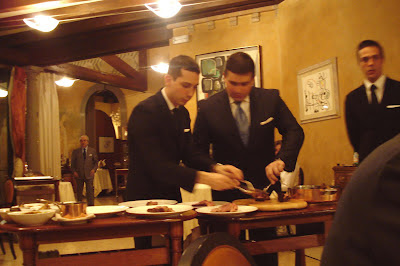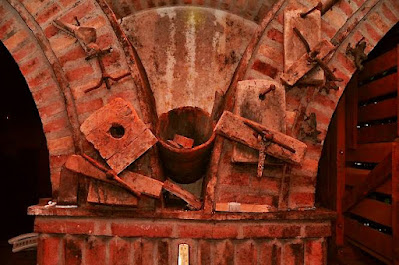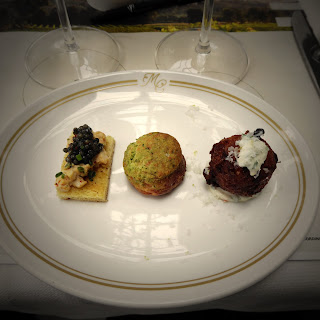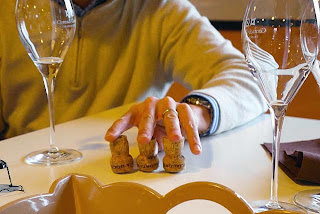Since the receding of the pandemic, the wine world has seen the starting up again of traveling shows, seminars and winemaker presentations. And of course, the return of the Master Class, on just about everything.
In today’s hyper-aggrandized environment for aspiring wine professionals, where certification is all the rage, one would think that someone like a master sommelier or master of wine could be more than capable of teaching such a class. And many are. Likewise, I’ve been in master classes led by master sommeliers who had me squirming in my seat for their lack of preparation and dissemination of faulty and incomplete material. After all, they too, are only human. But there is an expectation around an event like a master class, that one who attends such a seminar comes away having greater knowledge of the subject than what he or she had before such an experience. It isn’t necessary that such a class be taught by a master, but it should be handled by someone who has mastery of the subject and is fully capable of communicating the necessary information.
One such event, and the person who presented it, provided the perfect example of what a master class should be. The event was Discovering Franciacorta, Italy’s premiere sparkling wine. It was sponsored by the Consorzio Franciacorta and arranged by Constance Chamberlain of Wine & Co. The presenter was Franciacorta Ambassador May Matta-Aliah, DWS. It was held in Dallas at the tres chic Mister Charles restaurant, in their main dining room. In my career days, I often sat at the soda counter, when it was the Highland Park Pharmacy, and had a quick grilled cheese sandwich and a Dr. Pepper, in between account appointments. It was nice to be back in a space that had been restored, re-imagined and reinvented for today. And on this day, we were in store for some delicious wines (and foods), with a nice dollop of education about Italian wine and specifically, Franciacorta.
 |
| The dining room at L'Albereta with Chef Marchesi looking on from afar |
Franciacorta is near and dear to me from my working days. I always loved to stop at L’Albereta in Erbusco, where we would stay while visiting our suppliers, Bellavista and Contadi Castaldi. I would take clients there to visit and we had some fantastic meals at the restaurant, especially when Gualtiero Marchesi was alive and at the helm of the ship. One of Italy’s great chefs in the 20th century, in a room that was impeccably arranged.
This time, Franciacorta came to us in Dallas and the restaurant provided a rare convergence of food with the wine that was quintessentially kismet.
Franciacorta Ambassador May Matta-Aliah started on time and the event lasted approximately 2 hours. Enough to learn a little about Franciacorta, taste three flights of wine (nine wines total) and sample them with seven small bites from the chefs at Mister Charles.
Wine Ambassadors come in a variety of styles and
persuasions. There are the “guns for hire” varieties, which can sometimes come
off as “shilling for dollars.” Then there are those who are engaged in the
subject matter and present it in an educational yet entertaining manner. Ms.
Matta-Aliah is from the latter camp. She gave a good background on the subject,
complete with a nicely done Audio-Visual program. She didn’t belabor the
presentation with personal anecdotes – it wasn’t about her. She was professional
and I came away knowing a more about the subject and the wines than before
the seminar. And I’m fairly well versed in the wines and the area, having been
immersed in Franciacorta a time or two. Well done! I could only imagine what the younger
wine professional took away from this event – as it had lots of useful information.
And then there was the tasting.
We had three flights of three wines each, starting with the Satēn, going to the Brut and finishing with the Rosé wines. And even though we are talking sparkling wine in the classic method, Franciacorta is more thought of as a wine to accompany food rather than a strictly celebratory sparkling beverage, which it also can be. But the Italian sensitivity is towards food with wine. Thus, the matched small bites were an additional point of illumination when it came to not just understanding Franciacorta, but also Italian wine, if not to Italian culture, altogether. How’s that for Italian-splaining?
First flight – Satēn – served with Ossetra caviar and egg salad on toasted brioche, and spring pea gougéres, and truffle beignet, chive crème fraïche
Berlucchi Franciacorta Satēn Brut 61 - Green nose, slightly buttery, acidic, sharp-Bright – good finish.
Barone Pizzini Franciacorta Satēn Brut 2019 – Yeasty – buttery, acidic, sharp citric and lean.
Castello Bonomi Franciacorta Satēn Brut 2019 – Evergreen, piney, fruity, lemon notes; bright slightly saor (ala Venice) – savory
 |
| shrimp Cappelletti |
Second flight – Brut – served with Blue Fin tuna crudo, Thai passion fruit dressing, and shrimp Cappelletti sauce velouté, Guajillo
Faccoli Franciacorta Brut – Delicate fragrant nose, slight butteriness; well balanced; good fruit, nice length, good finish. (matched well with the tuna crudo).
Castelfaglia Franciacorta Brut ‘Monogram’ Blanc de Blancs – Buttery, slight evergreen notes; thin, acidic, sharp (electric!)
Ca’ del Bosco Franciacorta ‘Dosaggio Zero’ 2019 – Saline nose, fleshy, slight butteriness. Thin (lean or skinny?) high acidity, good fruit, slightly spicy, some herbal quality. (Note: not too fizzy)
Third flight – Rosé – served with Seared scallop, roasted sunchokes, pomegranate, and Atlantic Halibut, cauliflower, sauce Vierge
La Montina Franciacorta Rosé Extra Brut – Fleshy, iron (rust? arrugginita?), slightly bitter, possible reductive note (maybe from product seeing exposure to heat in transit or in warehouse?)
Contadi Castaldi Franciacorta Rosé Brut – rich nose, spicy; berry/raspberry notes. Nice balance, good fruit, but kind of an odd wine. Feels a little bit commercial.
Ferghettina Franciacorta Rosé Brut – Straight Pinot noir (100%) lots of berry and savory notes.
(Didn’t go too well with the vinegary sauce Vierge.)
Overall, the wines showed well and there was a varied group of wines showing, from larger commercial houses to smaller boutique operations. Franciacorta is a small appellation, but inside the area there is a great deal of diversity in soil, exposure and climate. And of course, opinions on winemaking. It is Italy, after all.
I had a little laugh I shared with another participant, James LaBarba. James and I worked together from 1989-1992 at American Wine, started by his father Tony LaBarba. We sold Berlucchi (sparkling) and Ca’ del Bosco (still and sparkling) back then, which was, for both of us, half-a-lifetime ago. I noted to James in casual conversation during a break, that our half-a-life-time ago was, for almost everyone else in the room, a lifetime ago, as most of the attendees were not born, back then when we were trying to get some traction for Franciacorta in Dallas and in Texas. Thankfully, now, we have a larger legion of younger professionals who can take up the torch and climb those mountains for Italy and Franciacorta wines. It is truly something to be grateful for, to watch the progression of the generations and the advances being made.
Thanks again to the Franciacorta Consorzio, and to Constance and to May, for making Dallas one of their stops. For too long, we were flyover country. But now, Texas, Dallas, Houston, Austin, and other urban areas, are seeing more immersion from the educational resources to forward the cause of Italian wine.
 |
| Lake Iseo |
- Further writing on this blog, over the years, about Franciacorta







